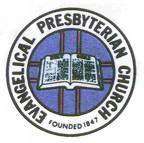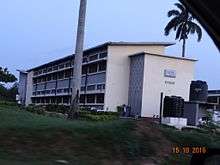Evangelical Presbyterian Church, Ghana
The Evangelical Presbyterian Church, Ghana (Ewe: Presbyteria Nyanyui Hame le Ghana) is a Protestant Christian denomination in Ghana. It is popularly referred to as the "EP Church". It has strong roots in the Evangelical and Reformed traditions.
| Evangelical Presbyterian Church, Ghana | |
|---|---|
 Evangelical Presbyterian Church, Ghana logo | |
| Classification | Protestant |
| Orientation | Calvinist |
| Theology | Liberal Reformed |
| Polity | Presbyterian |
| Associations | |
| Region | Ghana |
| Origin | 1847 |
| Congregations | 748 |
| Members | 600,000 |
| Official website | www.epchurchghana.org |
History
The Evangelical Presbyterian Church Ghana was founded by German missionaries on 14 November 1847 in Peki.[1] These missionaries from the North German Mission Society (Norddeutsche Mission, Bremen), together with the Basel Mission in 1847, started work among the Ewe people in what is now the Volta Region of Ghana. By the beginning of World War I, they had established two mission stations in the British colony of the Gold Coast and seven in the German territory of Togoland. The first of the mission stations was (Mission-Tove) in present-day Togo.[2]
After the war, Togoland was divided into two territories, the western one under British rule and the eastern one under French rule. The first synod of the mission stations in May 1922, despite the division of Togoland, declared itself to be the supreme governing body of the "Ewe Church". The church adopted the congregational order of the Bremen Mission. In 1923, Scottish missionaries began working in British Togo (Transvolta Togoland), which is the present-day Volta Region of Ghana. The church in French Togoland (now Togo) was run by the Paris Mission.
As a result, development proceeded separately in the two territories, although both churches share the same constitution. They hold a common synod meeting every 4 years.[3]
Belief
The EP Church is a Trinitarian church.
Church information
The EP church has its headquarters at Ho, the capital of the Volta Region of Ghana. It has more than 600,000 members in nearly 750 congregations. The overall leader of the church is known as the Moderator of the General Assembly.[4] The current Moderator of the General Assembly of the church is Rt. Rev. Dr. Seth Senyo Agidi.[5][6] He succeeded Very Rev. Francis Amenu in 2015, who had been elected as the first Moderator of the General Assembly, which was constituted in 2009.[7]
The previous gathering of the churches was known as the General Synod. The last Moderator of the General Synod was Rt. Rev. Dr. L.K Buama, whose term ended in 2009.[8]
Past Moderators
The first Moderator was elected in 1922, when the Togo and Gold Coast branches of the church held their first Joint Synod.[9]
- Very Rev. Andreas Aku - (1922)
- Very Rev. David Bensah (1923 – 1926)
- Very Rev. E. Awuma (1927 – 1939)
- Very Rev. B.S. Amegashie (1940 – 1951)
- Very Rev. M.W. Akama (1952 – 1956)
- Very Rev. E.K. Galevo (1957 – 1968)
- Very Rev. A.K. Abutiate (1969 – 1972)
- Very Rev. C.K. Dovlo (1969 – 1972)
- Very Rev. Noah Komla Dzobo (1981 – 1993)
- Very Rev. Japhet Ledo (1993 – 2001)
- Very Rev. Livingstone Komla Buama (2001 – 2009)
Since 23 August 2008, the church changed from Synod status to General Assembly status. Since then, the Moderator is now officially known as 'The Moderator of the General Assembly'. The first Moderator since this change is Rev. Francis Amenu.
- Very Rev. Francis Amenu (2009 – 2015)
- Very Rev. Seth Senyo Agidi (2015 – date)
Past Synod Clerks
- Rev. Prof. Christian Gonçalves Kwami Baëta (1945–1949)
Education

The church is active in education and has established numerous primary and secondary schools, and a university college.[10][11] They include:
- Evangelical Presbyterian University College established in 2008[10][12]
- Central Municipal Campus, Ho and the Greenhills Campus at Peki, both in the Volta Region[13]
- E. P. Church Seminary, Peki was the first institution established by the church in 1864.[11]
- E. P. College of Education, Amedzofe, the first teacher training college to be established in 1946[11]
- E.P. College of Education, Bimbilla
- E.P. College of Education, Dzodze
- Mawuli School, Ho, set up by Mr. and Mrs. Trosts, missionaries sent by the United Church of Christ.[14]
- Mawuko Girls Senior High School also at Ho.
- E. P. Senior High School at Hohoe.[15]
- E. P. Senior High School, Saboba
- E. P. Agric. Senior High School, Tatale
- E. P. Technical Vocational Institute, Alavanyo
- E. P. Church Activity Centre, Ho
Health
The EP Church has also been active in providing health care.[11] Its facilities include:
- E. P. Church Hospital, Adidome[14]
- E. P. Church Hospital, Worawora
- E. P. Church Clinic, Wapuli
- E. P. Static Clinic, Ho
- Dan Moser Memorial Clinic, Dambai
- E. P. Church Clinic, Hatorgodo
- E. P. Church Clinic, Dzemeni
- E. P. Church Clinic, Bladjai
- E. P. Church Clinic, Kpalba-Saboba
- E. P. Church Pharmacy, Ho
- E. P. Church IHDN Hospital, Agbozume
- E. P. Church Nazareth Healing Complex, Vane, Avatime
Associations
- Christian Council of Ghana - member
- World Communion of Reformed Churches - member
Missionaries
One of the last missionaries to work with the Presbyterian church was Ian Strachan of the Church of Scotland. He was also the first headmaster of the E. P. Senior High School at Hohoe.[15]
Partner churches
- Eglise Évangélique Presbytérienne du Togo
- Church of Scotland
- Evangelical Church of Bremen
- United Reformed Church - A Ghanaian minister for London (formerly Ghanaian chaplain) works with the URC over four-year term and the church of origin alternates between the Evangelical Presbyterian Church and the Presbyterian Church of Ghana.[16]
References
- "Peki Citizens to celebrate the exploits of Bremen Missionary work in Ghana". Ghanaweb. Archived from the original on 7 April 2014. Retrieved 4 April 2014.
- "Eglise évangélique presbytérienne du Togo". Address data base of Reformed churches and institutions. Reformed Online. Retrieved 2 August 2007.
- "Presbyteria Nyanyui Hame le Ghana". Address data base of Reformed churches and institutions. Reformed Online. Retrieved 2 August 2007.
- "Our hosts". Accra 2004. World Alliance of Reformed Churches. Archived from the original on 14 August 2007. Retrieved 2 August 2007.
- "Evangelical Presbyterian Church inducts new moderator". www.ghanaweb.com. Archived from the original on 21 January 2016. Retrieved 9 September 2015.
- "EP Church gets new Moderator". www.ghanaweb.com. Archived from the original on 21 January 2016. Retrieved 9 September 2015.
- "E.P. Church Elects New Moderator". Ghana government. Archived from the original on 8 October 2008. Retrieved 7 February 2009.
- "FOREWORD". Official website. Evangelical Presbyterian Church, Ghana. Archived from the original on 19 April 2017. Retrieved 23 October 2008.
- "Brief History". Official website. Evangelical Presbyterian Church, Ghana. Archived from the original on 9 March 2012. Retrieved 9 June 2012.
- "Evangelical Presbyterian University College ready for opening". Ghanaweb.com. Archived from the original on 28 September 2013. Retrieved 25 September 2013.
- "Educational And Health Institutions". epcgh.org. Evangelical Presbyterian Church, Ghana. Retrieved 20 June 2020.
- "Evangelical Presbyterian University College". epuc.edu.gh. Evangelical Presbyterian University College. Retrieved 19 June 2020.
- "The University has two campuses to start with". epuc.edu.gh. Evangelical Presbyterian University College. Retrieved 19 June 2020.
- "General Ministries". Global Ministries. 7 October 2005. Archived from the original on 28 September 2007. Retrieved 2 August 2007.
- "Brief History Of The Church: History from 1951-1980". epcgh.org. Evangelical Presbyterian Church, Ghana. Retrieved 19 June 2020.
In that same year, Rev. Ian Strachan and his wife, Moyer, arrived from the Church of Scotland as a Youth Worker and it was in that same year that the Christian Youth Builders (CYB) began to develop. A Secondary School at Hohoe was established on 28 September 1961 with Rev. Ian Strachan as the first Headmaster.
- "News from the Ecumenical Committee". United Reformed Church. Archived from the original on 26 June 2007. Retrieved 2 August 2007.
External links and sources
- Official Website
- Presbyteria Nyanyui Hame le Ghana
- Eglise évangélique presbytérienne du Togo
- Information about Evangelical Presbyterian Church, Ghana
- Global Ministries of the Christian Church (Disciples of Christ) and the United Church of Christ
- News from the Ecumenical Committee (United Reformed Church)